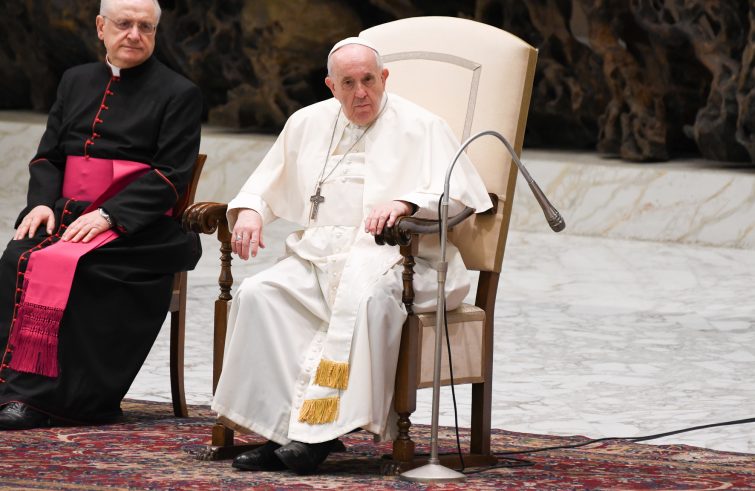
“On 8 December 1870, Blessed Pius IX proclaimed Saint Joseph Patron of the Universal Church. One hundred and fifty years on from that event, we are living a special year dedicated to Saint Joseph, and in the Apostolic Letter Patris corde, I gathered together some reflections on him.” With these words Pope Francis opened a cycle of catechesis on the figure of St Joseph in the Paul VI Hall on Wednesday, November 17.
“Never like before, today, in this time marked by a global crisis made up of several components, can he offer us support, consolation and guidance”, Francis said: “Therefore, I have decided to dedicate a cycle of catecheses to him, which I hope may further help us to let ourselves be enlightened by his example and by his witness. For a few weeks we will talk about Joseph.” Francis reminded the faithful: “There are more than ten people in the Bible who bear the name Joseph.” “The most important among them is the son of Jacob and Rachel who, through various vicissitudes, went from being a slave to becoming the second most important person in Egypt after the Pharaoh. The name Joseph is Hebrew for ‘may God increase, may God give growth.’ It is a wish, a blessing based on trust in providence and referring especially to fertility and to raising children.” “Indeed, this very name reveals to us an essential aspect of Joseph of Nazareth’s personality”, Francis remarked: “He is a man full of faith, in providence: he believes in God’s providence, he has faith in God’s providence. His every action, as recounted in the Gospel, is dictated by the certainty that God ‘gives growth’, that God ‘increases’, that God ‘adds’: that is, that God provides for the continuation of his plan of salvation. And in this, Joseph of Nazareth is very similar to Joseph of Egypt.” The first geographical reference to Joseph, Bethlehem and Nazareth, also assume an important role in our understanding of his figure. In fact, the Son of God, “did not choose Jerusalem as the place of his incarnation, but Bethlehem and Nazareth, two outlying villages, far from the clamour of the news and the powers of the time.”
“The choice of Bethlehem and Nazareth tells us that the periphery and marginality are preferred by God”,
Francis pointed out. “To fail to take this fact seriously is equivalent to not take seriously the Gospel and the work of God, who continues to manifest himself in the geographical and existential peripheries”, the Pope exclaimed, adding in unprepared remarks:
“The Lord always acts in secret in the peripheries, even in our souls, in the peripheries of the soul, of feelings. The Lord continues to manifest himself in the peripheries, both geographical and existential. Jesus always goes out to the peripheries of our heart, the peripheries of our societies, of our family, of our soul – this is, that slightly obscure part that we do not show, perhaps out of shame.”
“In this respect, the society of that time is not very different from ours”, Francis commented: “Today, too, there is a centre and a periphery. And the Church knows that she is called to proclaim the good news from the periphery.” “In particular, Jesus goes in search of sinners; he goes into their homes, speaks with them, calls them to conversion,” despite being rebuked by the doctors of the law: “He goes in search also of those who have done no evil but have suffered it: the sick, the hungry, the poor, the last.”
He “looks into the corners, in the shadows, at the peripheries, at what the world does not want”,
audiencJoseph’s lesson: “He reminds each of us to accord consider important what others discard. In this sense he is truly a master of the essential: he reminds us that what truly matters does not attract our attention, but requires patient discernment to be discovered and appreciated. To discover what matters.” “Let us ask him to intercede so that the whole Church may recover this insight, this ability to discern, this capacity to evaluate what is essential”, the Pope’s invitation: “Let us start again from Bethlehem, let us start again from Nazareth.” In his closing remarks, Francis sent out “a message to all the men and women who live in the most forgotten geographical peripheries of the world, or who experience situations of existential marginalisation”, in the form of a prayer, “a “home-made” prayer, but one that comes from the heart”: “Saint Joseph, you who have always trusted God, and have made your choices guided by his providence teach us not to count so much on our own plans but on his plan of love. You who come from the peripheries help us to convert our gaze and to prefer what the world discards and marginalises. Comfort those who feel alone and support those who work silently to defend life and human dignity. Amen.”











